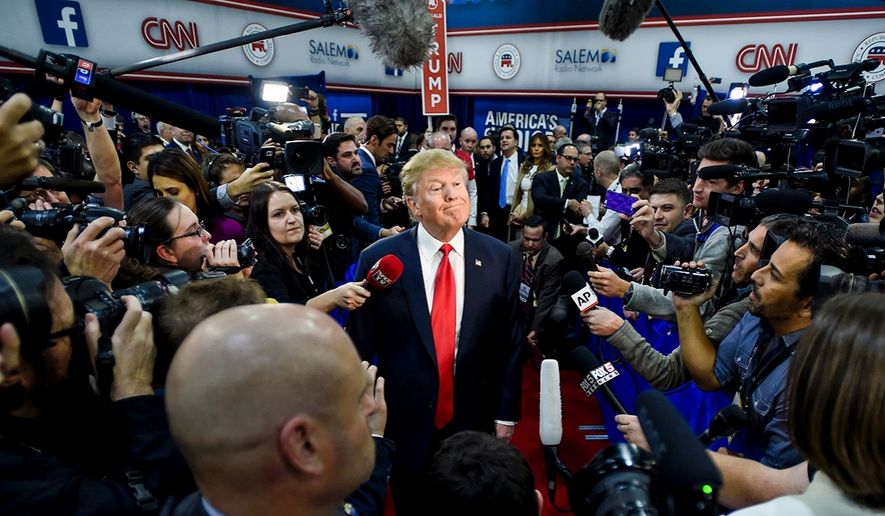Republicans rallied to Donald Trump in July, but the good feelings have quickly faded as the billionaire businessman struggles to keep his foot out of his mouth — and to keep GOP voters from jumping ship.
The gains he made in the polls, particularly among self-identified Republicans, have evaporated. And the embarrassing divisions between him and elected Republican leaders have once again reappeared.
The latest crack came Tuesday when Rep. Richard L. Hanna, who is retiring at the end of this year, became the first sitting Republican member of the House to say he will cast his vote for Democratic nominee Hillary Clinton.
Mr. Hanna said Mr. Trump’s feud with the Muslim parents of a U.S. Army captain slain while leading troops in Iraq was more than he could stomach, adding to a pile of philosophical fights and questions about the billionaire businessman’s brash style.
“He is unfit to serve our party and cannot lead this country,” Mr. Hanna said.
The worries are reflected in the polls, which show Mr. Trump with less support among Republicans than Mrs. Clinton now has among Democrats.
“Some of the erosion post-convention is that she has gained among independents, and she definitely has the Democratic Party more united post-convention,” said John McLaughlin, a GOP pollster working for Mr. Trump.
Polls show Mrs. Clinton is more well liked than Mr. Trump among members of their respective parties, and Mrs. Clinton has done a better job of holding onto the gains she’s made.
By contrast, Mr. Trump is shedding backers.
A CNN/ORC poll last month showed the Republican candidate with 85 percent support among Republicans, but it dipped to 78 percent in the CNN poll released Monday. And a CBS poll this week showed just 64 percent of self-described conservatives are backing Mr. Trump.
Mr. Trump told The Washington Post on Tuesday that he was not ready to endorse House Speaker Paul D. Ryan, who backed Mr. Trump after some hesitation, and said he would not back Sen. John McCain in his re-election race in Arizona.
The New York billionaire, meanwhile, has blamed his recent struggles on the news media, and said that “something funny” is going on with the polls.
He also has targeted Republicans that have run away from him.
“Certain people that I ran against in the Republican primaries have never come back, and they probably won’t, and that’s OK,” Mr. Trump said Monday in Ohio. “I do better when they don’t come back. I do better if I have them as my opponents as opposed to my ally.”
David Johnson, a Georgia-based GOP strategist, said that Mr. Trump has responded in a Barry Goldwater-esque fashion to his critics in the GOP — particularly those in the Republican establishment that think the New York billionaire is not qualified for the job and could siphon some of the influence they hold in the party.
“Trump seems to go out of his way to antagonize members of his party,” Mr. Johnson said. “He is doing nothing to appease them and bring them on board.”
President George W. Bush, the last victorious Republican presidential nominee, won 93 percent of Republicans and 84 percent of self-described conservatives in 2004 — much higher than the 78 percent and 64 percent, respectively, at which Mr. Trump is polling.
In 2008 Sen. John McCain of Arizona won 90 percent of Republicans and 78 percent of self-described conservatives, and in 2012, former Massachusetts Gov. Mitt Romney won 93 percent of Republicans and 82 percent of conservatives.
“The challenge is [Trump] has to get about 85 percent of the Republicans to win, and he has to win with independents,” Mr. McLaughlin said, adding that Democrats have made up a bigger chunk of the electorate in recent presidential cycles. “The question is: Can Trump bring out millions more voters that would offset the Democratic edge that they had four years ago?
“He is building a new coalition of Republican voters,” Mr. McLaughlin said.
Mr. Johnson said the good news for Mr. Trump is that he is still within striking distance of Mrs. Clinton.
“You would expect Hillary to blow him out of the water, and she is not,” he said. “The question is has he found a new formula.”
Campaigning in Virginia on Tuesday, Mr. Trump continued to reach out to disenfranchised voters that feel as though they have been burned by free trade and immigration.
The crowd cheered his vow to slap a 35 percent tax on companies that relocate outside of the U.S.
“They are going to pay a tax — very simple,” Mr. Trump said. “Now a lot of people think I’m not conservative because I want them to pay a tax. I think they’re not conservative because they are stupid.”
• Seth McLaughlin can be reached at smclaughlin@washingtontimes.com.




Please read our comment policy before commenting.